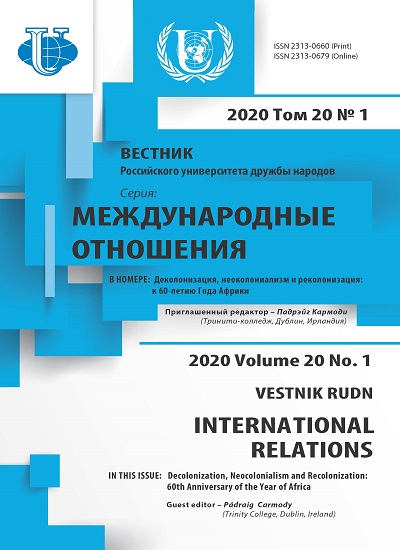Paris vs. Beijing: Confrontation on the African Continent
- Authors: Philippov V.R.1
-
Affiliations:
- Institute for African Studies, RAS
- Issue: Vol 20, No 1 (2020): Decolonization, Neocolonialism and Recolonization: 60th Anniversary of the Year of Africa
- Pages: 84-96
- Section: THEMATIC DOSSIER
- URL: https://journals.rudn.ru/international-relations/article/view/23324
- DOI: https://doi.org/10.22363/2313-0660-2020-20-1-84-96
Cite item
Full Text
Abstract
The subject of this study is the competitive relations in the political and economic spheres that have developed on the African continent in the 21st century between the French Republic and the People’s Republic of China. The author focuses on the main conflict-generating factors that caused the latent confrontation between the two countries that arose in the face of a changing geopolitical situation in the world in general and in Africa in particular. The methodological basis of this study is the comparative historical method; the work is based on the principles of historicism, reliability and scientific objectivity. Using the method of historical reconstruction allowed the author to trace the dynamics of relations between France and China over the past two decades. The work is based on the study of factual historical material, a chronicle of the events of the last decade; analytical materials published on the pages of French and Russian mass media were used. The author concludes that the basis of the conflict between Paris and Beijing lies in the desire of the Champs Elysees not only to preserve the political, economic and military-strategic preferences of France in the countries that were formerly colonies of the French Empire, but also to protect French interests in the English-speaking countries of East Africa. The rapid growth of China’s influence on the African continent, the ever more obvious expansion of the Heavenly Empire into the economies of African countries, forces France to change the paradigm of its foreign policy. If the predecessors of E. Macron, denying in words the policy of “Françafrique”, relied on the use of military force and covert operations of the French security services then the current head of the Fifth Republic in his relations with African countries prefers to use his resources on “soft power” politics. The experience gained by E. Macron during his first (not very successful) African tour in 2017 prompted him to change the tone of communication with the leaders of African countries from patronically arrogant to friendly and trusting.
Keywords
About the authors
Vasiliy Rudolfovich Philippov
Institute for African Studies, RAS
Author for correspondence.
Email: fvrd@rambler.ru
PhD, Dr. of Sc. (History), Leading Researcher, Centre of Tropical Africa Studies
Moscow, Russian FederationReferences
- Abramova, I.O. & Morozenskaya, E.V. (Eds.). (2016). Africa: Current Economic Development Strategies. Moscow: Institut Afriki RAN publ. (In Russian).
- Amuhaya, C. & Degterev, D.A. (2019). Foreign Aid as Foreign Policy Tool: Competition of Aid Allocation Projects to Kenya between Japan and China. Asia and Africa Today, 12, 68—74. doi: 10.31857/S032150750007660-8
- Basiru, A. (2016). Extra-African Powers and the Crisis of Regionalism in Africa: Background to and Reflections on France’s Engagement with Africa. Africa Review, 2 (8), 96—107. doi: 10.1080/09744053.2016.1193941
- Blanchard, J.-M. & Flint, C. (2017). The Geopolitics of China’s Maritime Silk Road Initiative. Geopolitics, 22 (02), 223–245. DOI: https://doi.org/10.1080/14650045.2017.1291503
- Cheng, G., Chen, Lu, Degterev, D.A. & Zhao, J. (2019). Implications of “One Belt, One Road” Strategy for China and Eurasia. Vestnik RUDN. International Relations, 19 (01), 77—88. doi: 10.22363/2313-0660-2019-19-1-77-88
- Degterev, D.A. (2005). China — Africa: Important Aspects of Relations. World Economy and International Relations, 5, 84—91. (In Russian).
- Degterev, D.A., Li, Yan, Trusova, A.A. & Chernyaev, M.S. (2018). Priorities of Russian and Chinese Development Cooperation to Asia and Africa: A Comparative Analysis. Vestnik RUDN. International Relations, 18 (04), 888—905. (in Russian). doi: 10.22363/2313-0660-2018-18-4-888-905
- Deych, T.L. (2018). China’ Policy in North African and Eastern Mediterranean Countries. Journal of the Institute for African Studies, 2 (43), 95—110. (In Russian). doi: 10.31132/2412-5717-2018-43-2-95-110
- Dreher, A., Fuchs, A., Parks, B., Strange, A. & Tierney, M. (2017). Aid, China, and Growth: Evidence from a New Global Development Finance Dataset. AidData. Working Paper 46. URL: https://www.aiddata.org/publications/aid-china-and-growth-evidence-from-a-new-global-development-finance-dataset (accessed: 09.01.2020).
- Filippov, V.R. (2013). Burkina Faso: The Political Crisis of 2011. International Relations, 4, 424—438. (In Russian). doi: 10.7256/2305-560X.2013.4.9721
- Filippov, V.R. (2016). Françafrique: the Shadow of the Champs Elysees over the Black Continent. Moscow: Institut Afriki RAN publ. (In Russian).
- Filippov, V.R. (2017). Françafrique and Ethics in International Relations. Vestnik RUDN. International Relations, 17 (2), 402—415. (In Russian). doi: 10.22363/2313-0660-2017-17-2-402-415
- Filippov, V.R. (2018). E. Macron’s African Politics: “Soft Power” or the Power of Weapons? International Relations, 2, 110—122. (In Russian). DOI: 0.7256/2454-0641.2018.2.25868
- Fituni, L.L. & Abramova, I.O. (2012). Patterns of Formation and Change of Models of World Economic Development. World Economy and International Relations, 7, 3—15. (In Russian).
- Fituni, L.L. (2012). Africa: 21st Century Resource Wars. Moscow: Institut Afriki RAN publ. (In Russian).
- Kapitsa, L.M. (Eds.). (2013). Foreign Aid. Moscow: MGIMO publ. (In Russian).
- Ponomarenko, L.V. & Soloveva, T.M. (2015). China — Africa: New Directions of Cooperation. Vestnik RUDN. International Relations, 15 (1), 32—42. (In Russian).
- Powell, N.K. (2017). Battling Instability? The Recurring Logic of French Military Interventions in Africa. African Security, 10, 47—72. doi: 10.1080/19392206.2016.1270141
- Sindzingre, A. (2013). The Ambivalent Impact of Commodities: Structural Change or Status Quo in Sub-Saharan Africa? South African Journal of International Affairs, 20, 23—55. doi: 10.1080/10220461.2013.780327
- Wyss, M. (2013). The Gendarme Stays in Africa: France’s Military Role in Côte d’Ivoire. African Conflict and Peacebuilding Review, 3, 81—111. doi: 10.2979/africonfpeacrevi.3.1.81











